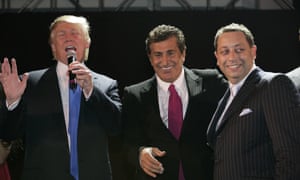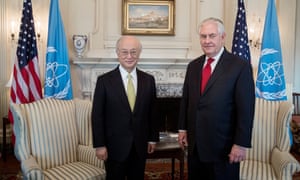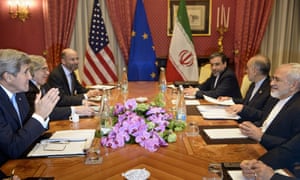Felix Sater: the enigmatic businessman at the heart of the Trump-Russia inquiry
The Moscow-born former Trump associate’s name emerged in leaked emails – and he tells the Guardian to expect ‘many more stories’ about him to come
 Donald Trump, Tevfik Arif and Felix Sater attend the Trump SoHo launch party in 2007. Sater has quickly emerged as a key figure in the Trump-Russia investigation. Photograph: Mark Von Holden/WireImage
Donald Trump, Tevfik Arif and Felix Sater attend the Trump SoHo launch party in 2007. Sater has quickly emerged as a key figure in the Trump-Russia investigation. Photograph: Mark Von Holden/WireImage
Felix Sater, a Moscow-born businessman now at the centre of the Trump-Russia affair, says he lives by a simple code: “Screw me once, shame on you; screw me twice, shame on me for letting it happen.”
As the Trump presidency finds itself increasingly hemmed in by an investigation into possible collusion between the Trump campaign and the Kremlin, and as key protagonists hire their own lawyers and reportedly make their own arrangements with prosecutors, they are words likely to become ever more relevant to those caught in the whirlpool.
Whatever the truth of Donald Trump’s relationship with the Kremlin and Vladimir Putin, Sater is likely to end up being part of the story. He surfaced this week in leaked emails that he sent in 2015 to Trump’s lawyer, claiming he could engineer Putin’s support for a Trump Tower in Moscow and thus, somehow, a victory in the US presidential election.
“Our boy can become president of the USA and we can engineer it,” Sater said, according to one of the emails, leaked to the New York Times. “I will get all of Putin’s team to buy in on this, I will manage this process.”
The real estate deal never happened, but Sater’s predictions of a world-changing political triumph proved to be prescient. Quite what that triumph had to do with Putin is now under scrutiny by a special counsel in Washington and a handful of congressional committees.
Sater’s links to Trump’s circle can be traced back to not long after he came to the US as a child. His father, Mikhail Sheferovsky (who changed the family name after arriving in New York) became a local crime boss in Brighton Beach and Sater grew up on that side of Brooklyn, where he got to know another teenager in the neighbourhood, Michael Cohen, a Long Island boy who would go on to become Trump’s personal lawyer and vice-president of the Trump Organization.
Three decades later, it was Cohen whom Sater contacted when he thought he could win Putin’s backing for a Moscow real estate deal and Trump’s presidential run.
Sater first came directly into Trump’s orbit when he teamed up with one of his neighbours, another Soviet-born striver, Tevfik Arif, a Kazakh developer who set up the Bayrock real estate firm in 2001 with offices in Trump Tower. Sater rose to become managing director, and Bayrock went into partnership with Trump to build the Trump SoHo hotel.
Trump, Arif and Sater were masters of ceremonies at the official opening in Manhattan in September 2007, and pictures of the event show them basking together in the glow of the publicity.
Sater was forced out of the limelight not long after, when details of his criminal record appeared. His first career as a stockbroker had come to a sudden end when he was jailed for slashing a man with the stem of a shattered margarita glass.When he emerged from a year of prison (“the worst time in my life”, he told Talking Points Memo), he got involved in a mob-run stock exchange scam, persuading gullible customers to buy worthless shares.
He was caught again but this time he did not go to jail. Instead, he and two other defendants struck a deal with the US government, offering his services in return for leniency. The extent of what he did for government agencies is not exactly clear.
According to a book co-authored by another defendant in the case, Salvatore Lauria, Sater used his contacts in the Russian underworld to help the CIA buy back Stinger missiles that had fallen into the hands of Afghan jihadists, although the buy-back scheme failed. Sater has claimed that his secret work in Russia for the CIA started before the stock fraud was exposed.
However, according to an unsealed transcript of a New York hearing in 2011 in which the justice department sought to keep Sater’s deal secret, Sater’s cooperation went much further than counter-terrorism.
The government’s lawyer Todd Kaminsky told a court that Sater, referred to throughout the proceedings as John Doe, had provided cooperation that “was of an extraordinary depth and breadth, almost unseen, at least in this United States attorney’s office”.
Kaminsky added that “unlike some cooperators who cooperate within one type of organized crime family or over one type of crime, Mr Doe’s cooperation runs a gamut that is seldom seen”.
“It involves violent organizations such as al-Qaida, it involves foreign governments, it involves Russian organized crime. And, most particularly, it involves various families of la Cosa Nostra. By that, specifically, I mean an individual on the ruling board of the Genovese crime family, a captain in the Bonanno crime family, a soldier in the Gambino crime family, the list goes on and on.”
Kaminsky continued: “Now, at the time of the sealing in 1998 and through the beginning of 2008, Mr Doe worked in a proactive capacity actively aiding grand jury investigations that involved surreptitious recordings of individuals as well as other undercover actions.”
Sater disputed this version of events, however, insisting all of his work for the government was abroad.
“I have never been a mafia informant ever in my life,” he told the Guardian in an email. “I was a cooperating witness on my 1998 Wall street case as where 15 other defendants [sic], that case basically ended in 2000. My work with various US government agencies both before the 1998 case as well as for over [two] decades after was in the area of National Security and did not include any mafia members of any kind.”
Sater added: “That work went into high gear after Sept 11, when America was attacked.”
His government service ended in 2009, when he was finally sentenced for the securities fraud charges more than a decade earlier, paying a $25,000 fine and spending no time in jail. By now, however, his criminal past had been exposed. But there was still one Manhattan high-roller willing to make use of Sater’s particular skills.
Sater told New York Magazine: “I stopped up to say hello to Donald, and he says, ‘You gotta come here.’”
The Trump Organization has insisted that Sater was never an employee but he worked out of Trump Tower and carried a now infamous business card identifying him as “senior advisor” to Trump.
“Donald wanted me to bring deals to him. Because he saw how many I put on the table at Bayrock,” Sater said.
“I know you’re gonna be able to spin it as ‘He doesn’t care and will do business even with gangsters,’” Sater told New York Magazine. “Wouldn’t it also show extreme flexibility, the ability not to hold a grudge, the ability to think outside the box, and it’s okay to be enemies one day and friends the next?”
What Sater did for Trump from that time on is part of the puzzle that entwines Trump with Moscow. What is known is that he was involved in the abortive attempt to secure Trump a slice of the Moscow real estate market and that he took part in an effort, also involving Michael Cohen, to promote a Moscow-backed peace plan in Ukraine that would have left Crimea in Russian hands on a long-term lease, and potentially to the removal of the Ukrainian president, Petro Poroshenko. The plan was delivered to the White House before being leaked and ditched amid international outrage.
Among the many unknowns is the question of whether he returned to his collaboration with the FBI. The Financial Times has reported he is cooperating with an international investigation into Kazakh money-laundering, but he has not said whether he is talking to Robert Mueller, the special counsel looking into possible Trump-Kremlin collusion.
As Sater predicted in an email to the Guardian: “[T]here are many additional stories that will be coming out about me in the future, much more timely and important than 20 year old stock cases.”

